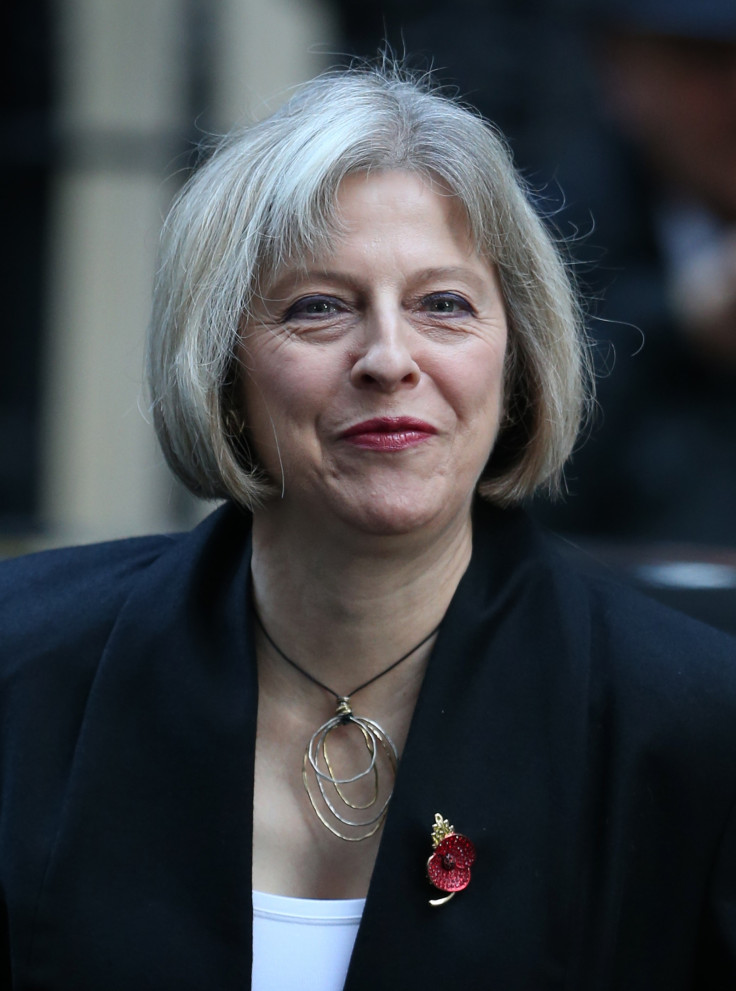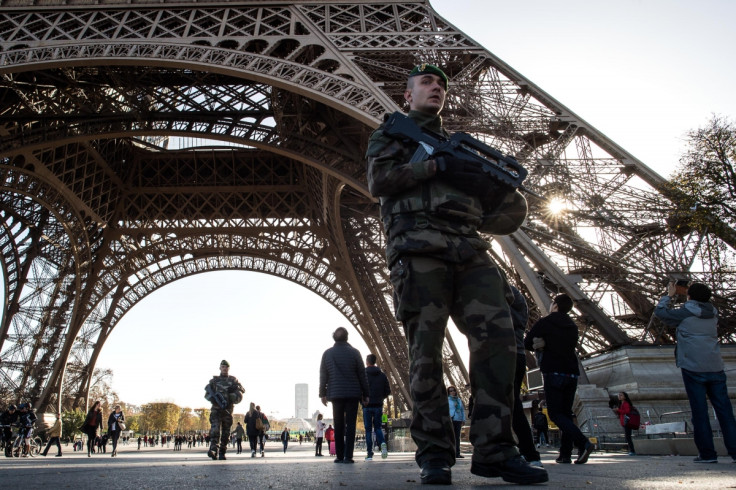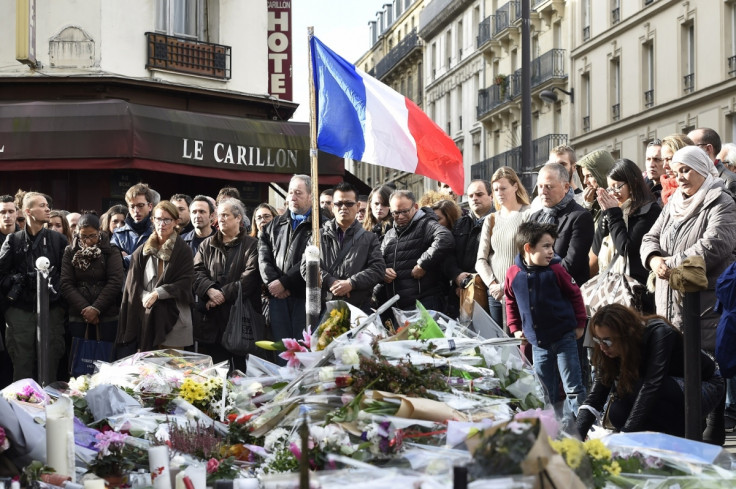Paris attacks: Full speech as Theresa May outlines UK's response in wake of France terror strikes

Home Secretary Theresa May has outlined the UK's response in the wake of the terror attacks in Paris, including intensifying police presence at events in major cities and increasing staff at MI5, MI6 and GHGQ by more than 1900.
The full speech, delivered in the House of Commons, can be read below:
With permission, Mr Speaker, I would like to make a statement about the terrorist attacks in Paris, our response and the threat we face from terrorism in the United Kingdom.
The full details of last Friday's horrific attack in Paris are still emerging. But at least 129 innocent people – including at least one British national – have been killed, more than 352 injured, with 99 of those declared critical.
As the names of those brutally murdered become known, and we learn more about the appalling events of that night, our thoughts and prayers are with all those who have lost loved ones, suffered injuries, or are affected by these horrific events.
These were coordinated attacks, designed to inflict the maximum number of casualties on people who were simply enjoying their daily lives – our way of life. Those killed and injured include people from many countries across Europe and other countries around the world.
The international investigation into the attacks is ongoing, but we know that Isil [has] claimed responsibility. This is not the first time Isil has struck in Europe. We have seen attacks either inspired or directed by the group in France, Belgium, Denmark, as well as attacks in Lebanon, Turkey and Kuwait, and the ongoing devastating violence in Syria and Iraq. And in June, 30 British nationals along with others were killed by a gunman at a tourist resort in Tunisia.
It also looks increasingly likely that the Russian Metrojet plane which crashed two weeks ago in Egypt was brought down by a bomb. But the scale of this latest attack and the degree of coordination and planning leave us with little doubt that the threat is evolving.
In the UK the threat level – set by the independent Joint Terrorism Analysis Centre – remains at severe, meaning an attack is highly likely and could occur without warning. In the past months a number of serious plots have been disrupted here in the UK. Over 750 people are thought to have travelled to Syria and Iraq, and approximately half of those have returned.
Our law enforcement and security and intelligence agencies are working constantly day and night to keep the people of this country safe and secure. And the government is taking all necessary steps to make sure they have the powers, the capabilities and resources they need.
As soon as the attacks took place, we took steps to maintain the security of the UK. The police have increased their presence on some streets and at some locations, and they will be intensifying their approach at events in big cities. Officers are working closely with London's communities and businesses to provide advice and reassurance.
Border Force has intensified checks on people, goods and vehicles entering the UK from the near continent and elsewhere. Additionally, in order to help the French authorities secure their own border, Border Force and the police have been undertaking additional and targeted security checks against passengers and vehicles travelling to France via both maritime and rail ports and a number of airports across the country.

Yesterday I chaired a meeting of COBR to review the situation and our response. As I said in a statement afterwards, UK police and security services are working extremely closely with their French and Belgian counterparts to identify all those involved and pursue anyone who may have been involved in the preparation for these barbaric attacks. And members will be aware that a number of arrests have been made in Belgium and France in the last 24 hours.
As I informed the House following the events in Paris in January, we have long had detailed plans for dealing with these kind of attacks in the UK. Since the attacks in Mumbai in 2008, we have improved our police firearms response, building the capability of our police and the speed of our military response. The emergency services have also improved their preparedness for dealing specifically with marauding gun attacks. Specialist joint police, ambulance and fire teams are now in place at important locations across England, with equivalents in Scotland and Wales.
This summer the police and the emergency services tested this response as part of a major counter-terrorism exercise. And as I have told the House previously, the police can call on appropriate military assistance when required across the country.
Nevertheless, in light of events in France, it is right that we should review our response to firearms attacks, and we are doing so urgently to ensure that any lessons are learnt.
The UK has some of the toughest firearms laws in the world. The sorts of weaponry used in the attacks in Paris in January, and those that appear to have been used last Friday, are not readily available in the UK. We must therefore focus on tackling firearms entering and moving throughout the EU, and ensuring that we have the right capabilities at the UK border to detect firearms being smuggled in.
This Friday I will attend an extraordinary meeting of the European Justice and Home Affairs Council where I will press the need for greater information sharing, passenger name records, and action on firearms. In the UK we have seen tough legislation work and so we want to see action taken to make a difference to the availability of firearms in Europe, particularly assault rifles.
Mr Speaker, it is imperative that Europe pulls together to defeat this threat. France is one of our oldest allies, and we work very closely with them on matters of national security and counter-terrorism. Yesterday I spoke to my counterpart the French Minister of the Interior – Bernard Cazeneuve – to offer our deepest condolences to France, and to make clear that the UK stands ready to provide any additional support and assistance. And I am very grateful to Minister Cazeneuve and the French for maintaining a police presence at Calais during this very difficult time. I have also spoke to the Belgium Interior Minister, Jan Jambon, to offer our assistance.
The House will also know that the Prime Minister is today at the G20 in Turkey, where he is urgently discussing with other heads of state the crisis in Syria. He will make a statement to this House tomorrow. Mr Speaker, since 2010, the government has undertaken significant work to strengthen our response to the threat we face from terrorism.
In 2014 we passed legislation to ensure law enforcement and the security and intelligence agencies could continue to access the information they needed. While that legislation does not expire until the end of 2016, last week we published the draft Investigatory Powers Bill. This Bill will improve the oversight and safeguards of the police and agencies' use of investigatory powers, while ensuring they have the tools they need to keep us safe.
Following any terrorist attack, we always consider the legal powers we have to keep our country secure, but it is important that this landmark legislation undergoes proper Parliamentary scrutiny.
Earlier this year, the Counter-Terrorism and Security Act passed into law, and includes measures to deal specifically with the problem of foreign fighters, and prevent radicalisation.
It includes a power to temporarily seize the passports of people suspected of travelling to engage in terrorism overseas, extends our ability to refuse airlines the authority to carry people to the UK who pose a risk, and includes a statutory Prevent duty for a wide range of public bodies.
Through our existing Prevent and intervention programmes, we identify people at risk and work to help them turn their lives around. Our Channel process in particular engages vulnerable people in conversations to prevent them being drawn further into extremism or violent acts.

Mr Speaker, the police and the security and intelligence agencies do an incredible job to keep the people of this country safe. Their work often goes unseen and unrecognised, but we owe them an enormous debt of gratitude.
Since 2010, we have protected the counter-terrorism policing budget. And as part of the budget earlier this year, my right honourable friend the Chancellor of the Exchequer confirmed that counter-terrorism spending across government would be protected across the course of the spending review.
Today, we have announced we will go further. Through the Strategic Defence and Security Review, we will make new funding available to the security and intelligence agencies to provide for an additional 1,900 officers – an increase of 15% – at MI5, MI6 and GCHQ to better respond to the threat we face from international terrorism, cyber-attacks and other global risks.
We will also boost aviation security. That is why the Prime Minister has ordered a rapid review of security at a number of airports around the world. Aviation specialists will conduct assessments over the next two months at locations in the Middle East and North Africa in particular.
This follows additional measures that the UK and US put in place at a number of potentially vulnerable airports over the past year, steps which will be reviewed to check that they go far enough. And tomorrow, at the National Security Council we will discuss the government's policy on aviation security and we will put forward a proposal to more than double government spending on aviation security over this Parliament.
Mr Speaker, the events in Paris have shocked and appalled people around the world. In France people have queued up to donate blood, lit candles and lain flowers. In Britain, Australia, America, Mexico, Canada, Brazil and many other countries iconic landmarks and buildings have been lit in the colours of the French Tricolour.
People of all faiths have condemned the violence and British Muslims and indeed Muslims worldwide have said very clearly these events are abhorrent. The attacks have nothing to do with Islam, which is followed peacefully by millions of people around the world.
The terrorists seek to divide us, and to destroy our way of life. But theirs is an empty, perverted and murderous ideology. They represent no one. And they will fail.
France grieves. But she does not grieve alone. People of all faiths, all nationalities, and all backgrounds around the world, are with you. And together, we will defeat them.
© Copyright IBTimes 2025. All rights reserved.





















